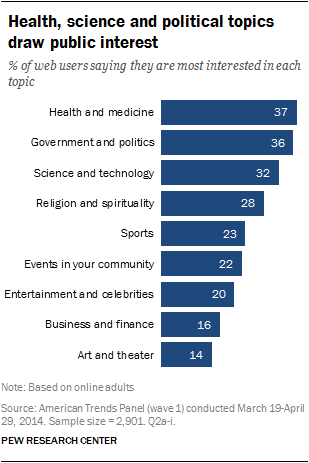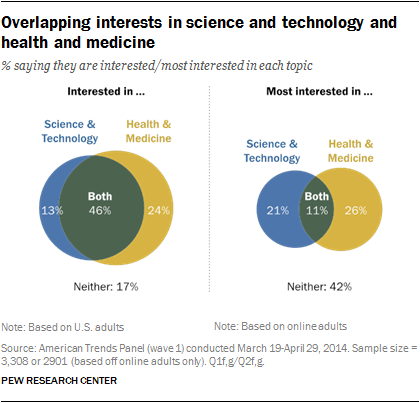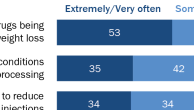
Most Americans express a broad interest in health and medicine, as well as in science and technology along with other topics. Seven-in-ten adults (70%) say they are interested in health and medicine, more than any other of the nine topics asked about in the survey. Large shares also say they are interested in local events in their community (61%), science and technology (59%) as well as government and politics (58%). About half of adults (53%) say religion and spirituality topics interest them. Slightly fewer say entertainment and celebrities (46%), sports (44%), business and finance (43%), or art and theater (41%) are topics that interest them.
The share of web users who express interest in each of these topics is statistically similar to the share of the entire population who report these interests.4

Web respondents on the American Trends Panel (but not those completing the survey by mail) were also asked to specify up to three topics among the set of nine they found “most interesting.” Online adults were especially likely to cite health and medicine, government and politics, and science and technology as topics of particular interest.
Some 37% of online adults say health and medicine is one of the topics they find most interesting, and 32% say science and technology is among the most interesting. A similar share (36%) says they are most interested in government and politics. Fewer adults, by comparison, cite a particular interest in other topics including: religion (28%), sports (23%), local events (22%), business and finance topics (16%), and art and theater (14%).
Some 37% of Americans enjoy keeping up with science news
In general, 37% of Americans say they enjoy keeping up with science news “a lot,” according to a separate Pew Research survey conducted by telephone Aug. 15-25, 2014. A figure that is roughly the same as found in a 2009 Pew Research Center survey (35%).
There are wide differences in enjoyment of following science news by educational level. Fully 58% of those with a postgraduate degree and 46% of those with a college degree say they enjoy keeping up with science news a lot. By contrast, 26% of those with a high school degree or less say the same.
Men are more likely than women to say they enjoy keeping up with science news a lot; 43% of men say this, compared with 32% of women.
There are also differences in enjoyment of science news by party affiliation with 43% of Democrats and independents who lean Democratic saying they enjoy following science news a lot, compared with 33% of Republicans and independents who lean toward the Republican Party.
There are two publics with a particular interest in either science and technology or health and medicine

A large share of adults who express some interest in science and technology also express some interest in health and medicine; 46% of adults say both of these topics interest them. But when it comes to the question of the top three topics of interest, only 11% of online adults say both science and technology and health and medicine are among their top three interests. Thus, there are two, mostly non-overlapping, publics who report a particular interest in either science and technology or health and medicine.
The health- and medicine-interested public is comprised of more women, the science- and technology-interested public is comprised of more men

Women are especially likely to express a strong interest in health and medical topics, while men are relatively more inclined to express an interest in science and technology. Women are more than twice as likely as men to say health and medicine is one of the three topics they are most interested in (52% do so, compared with 22% of men). Men are about twice as likely as women to say science and technology is in their top three (43% vs. 22%).
There also tends to be an age divide in interests. Older adults are more likely than younger adults to say health and medicine topics are of particular interest. And the reverse pattern tends to hold when it comes to science and technology.
Some 44% of adults ages 50 to 64 say they are most interested in health and medical topics, while 31% of those ages 18 to 29 and 33% of those ages 30 to 49 say the same.5 By contrast, some 39% of younger adults (ages 18 to 29) are particularly interested in science and technology topics, compared with 28% among those ages 50 to 64.6
Whites, blacks and Hispanics express roughly similar levels of interest in health and medicine. However, blacks are less likely than either whites or Hispanics to say science and technology is of particular interest (17% among blacks, compared with 33% among whites and 36% among Hispanics).

There are relatively modest differences in interest in both topics by education. Some 43% of postgraduate degree holders say they are especially interested in health and medicine, while fewer of those with a college degree (36%) or those with a high school degree or less (36%) say the same. But when it comes to science and technology, those with some college experience or more education are about equally likely to say they find science and technology to be of strong interest. Those with a high school degree or less are less inclined to say science and technology is of particular interest.
Partisan differences occur when it comes to interest in both topics. Democrats and independents who lean to the Democratic Party are more likely than Republicans and those who lean to Republican to say they are most interested in health and medicine (41% vs. 32%). Similarly, more Democrats and Democratic-leaners (35%) than Republicans and Republican-leaners (26%) say science and technology topics are of particular interest to them.
Religious groups hold roughly the same levels of interest in health and medical topics but vary when it comes to science and technology. Half of the religiously unaffiliated (50%) express a particular interest in science and technology topics, compared with 24% among Protestants and 26% among Catholics. Similarly, those who attend religious services at least weekly are less likely than others to rank science and technology topics of particular interest to them. There are no differences across religious traditions when it comes to interest in health and medicine topics, however. And those who attend religious services regularly are equally likely as less frequent attenders to express a particular interest in health and medical topics (37% do so among each group.)
Those who are more interested are also more knowledgeable about science topics

Those in the scientific community who have raised concerns about public interest in science topics also often link public interest with knowledge and understanding of science. For example, in Pew Research Center’s survey of U.S.-based members of the American Association for the Advancement of Science (AAAS) found broad concerns about the public’s knowledge of science, and some 57% considered a lack of public interest in science news to be a major reason behind the public’s limited knowledge about science.
Indeed, the new Pew Research Center analysis finds a strong association between public knowledge of science topics and reported interest levels. The American Trends Panel survey found that respondents reporting a particular interest in science and technology topics were also more likely to answer questions on a science knowledge quiz asked several months later correctly (mean 9.7 out of 12 correct questions, compared with 7.2 among those not interested in these topics).7 Of course, interest in science and technology topics may be helping drive more knowledge and more knowledge on science and technology topics may help spur interest levels. It’s not possible to parse out the causal mechanisms behind this association with these data.




